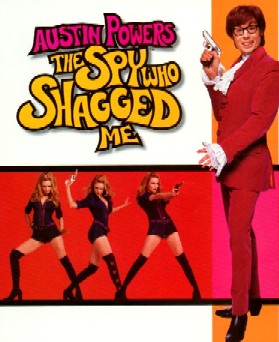|
Rotten Library > Culture > James Bond
James Bond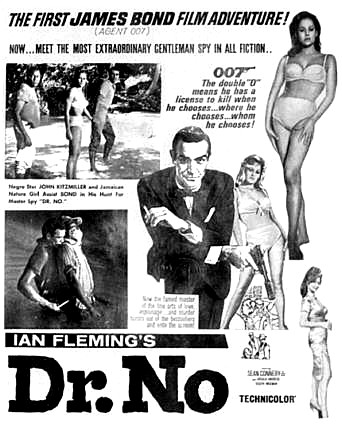 There's nothing that quite sums up the concept of British culture, elegance and class like Pussy Galore.
There's nothing that quite sums up the concept of British culture, elegance and class like Pussy Galore.For all its purported glamor, James Bond is right up there with Benny Hill in terms of storycraft as well as in the crass and cliched exploitation of chicks. In both cases, the end result is unsophisticated male masturbatory fare of the PG-13 variety. The only difference between Benny and James is the targeted viewer demographic. Benny Hill is for those men who have lost all hope of actually seeing a naked girl in real life. James Bond is for men who still cling to hope that they can sleep with the woman sitting next to them in the theater. And for the women sitting next to them, who cling to hope that they can sleep with James Bond. James Bond was the brainchild of Ian Fleming, the scion of one of Britain's great lines of inbred nobility. With ample "St. Croixs" and "Valentines" in the old family tree, Fleming had a life of luxury awaiting him, but patriotism and family tradition led him to military service in World War II. While working for Naval Intelligence, Fleming took part in some of the most elaborate spy schemes in history, as well as some of the silliest. After top Nazi Rudolph Hess made a bizarre defection to Britain in 1941, Fleming recruited Aleister Crowley to interrogate Hess about Nazi occult practices, to the great amusement of the intelligence community. (The interview never took place, but Crowley later served as inspiration for a Bond villain in Casino Royale.) After the war, Fleming took up full-time womanizing and dilettantism in the grand tradition of British nobility, but a scandal forced him into marriage in the 1950s. With all that libido and overactive imagination now penned within the limits of holy matrimony, Fleming set out on a writing spree that would revolutionize the spy genre. Plus he wrote Chitty-Chitty Bang Bang.
In fact, Bond pathologically harassed every woman he met, women such as Sylvia Trench, Honey Ryder, Pussy Galore, Kissy Suzuki, Plenty O'Toole, Mary Goodnight, Holly Goodnight, Bibi Dahl, Octopussy, Vesper Lynn, Fatima Blush, Xenia Onatopp, Elektra King and Molly Warmflash. You will find an endless number of Bond apologists in literary and film circles who will wax on endlessly about how "Bond girls" are empowered women in control of their lives, but let's face it -- there is a certain easily recognizable mentality that names women Pussy Galore or Plenty O'Toole. It's called "frat boy." Bond books were the ultimate in product placement, stories about adult males romping through a teenage boy's idealized wet-dream of a world, stuffed with gadgets, girls and intrigue, where the women are always willing and the villains are never winning. Because of this mentality, Ian Fleming was well on his way to becoming the male Jackie Collins, making Bond a footnote in the annals of literature alongside such testosterone mongers as Doc Savage, The Avenger and other manly pulp fiction heroes. Then someone came up with the bright idea of making it into a movie -- starting with Dr. No in 1962. It's arguable who benefitted most from the union of Sean Connery and James Bond, but the odds are pretty good that it was Bond. Connery was recommended for the role by Patrick McGoohan, a fellow Scotsman who'd made his fame playing secret agent John Drake on Danger Man, a British TV drama. Connery gave James Bond the one thing that the superspy so desperately needed -- sex appeal. Real sex appeal, that is. Not the macho self-centered Neanderthal throwback sex appeal that the character had been written with, but the wry, self-deprecating, winking sex appeal that Connery brought to his performance. By virtue of sheer charisma, Connery transformed James Bond from a man's idea of what women like into a woman's idea of what women like.
Connery appeared in several Bond films, but he would not be the only Bond. Several actors played the role (not counting the identity crisis mirth of Casino Royale), including Connery, Pierce Brosnan, Timothy Dalton, Roger Moore and George Lazenby. Brosnan gets points for being the most recent, but there are only two versions of the superspy who matter in the final analysis: Connery and Moore. Their peculiarly opposite performances of the character sum up the two opposite poles of the character, such as they are. On one end, you have copious style with a hint of substance. On the other, you have style, style and more style. Connery is the tough guy with a sensitive streak, equally at home holding a martini glass or punching you in the nose. The women come to see him, and the men want to be him. Moore is a debonair robot with empty eyes, an unintentionally post-modern interpretation with all the flash and prettiness, but no depth to speak of, memorable mostly for his impossibly dry delivery of one-liners. All the other actors are riffing on one of those two themes with varying degrees of success. The seemingly eternal appeal of the Bond franchise has dimmed in recent years, in part due to the severe decline in the number of Americans who find the name "Pussy Galore" even remotely witty. The rise of action movies featuring genuine tough guys in the leading roles has also cut into the franchise's longevity. The movie-going public wants heroes who look and sound more like the governor of California than the Prince of Wales.
Bond's sexual dysfunction has further limited the franchise's marketability in recent years. Bond has screwed more than 40 ladies in the course of the 20-some movies (the exact count of both movies and women is controversial for reasons too tedious to recount here). His seduction technique primarily involves "being James Bond," which causes panties to miraculously disappear everywhere he goes. Bond's silly sexcapades been amply lampooned in any number of venues, including an inspired Saturday Night Live sketch in which Bond is forced to call all his former lovers to tell them he's contracted VD, and the wildly popular Mike Myers brainchild Austin Powers. Considering that Bond's movie career began with a parody in the first place, it's mildly ironic that the Powers films have largely usurped the original Bond audience for itself. Yeah, baby! When Bond distributor MGM sued for trademark infringement over the Powers' title Goldmember, the snickering was palpable all over Hollywood. The suit was settled amicably, allowing the now visibly desperate MGM to show a free trailer for its upcoming Bond flick at all showings of Goldmember. Myers got the last laugh, with U.S. grosses that beat Die Another Day by more that $60 million. Nevertheless, the most recent Bond flick, Die Another Day pulled in a respectable $150 million in U.S. box office and even more overseas. As long as people are willing to pay cash money for the privilege of turning their brains off, there will be a James Bond.
all the movies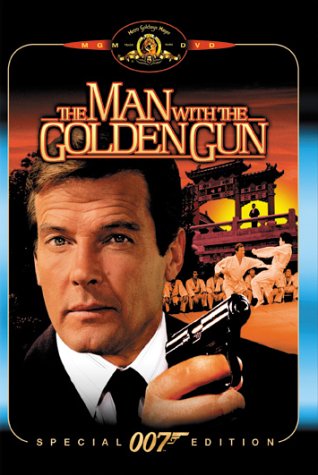 The most visible sign of how poorly the James Bond franchise has aged can be seen in its movie titles, which rely inordinately on variations of the words "live," "die," "gold" and "kill." Hell, "Tomorrow Never Dies" and "Die Another Day" aren't even different titles.
The most visible sign of how poorly the James Bond franchise has aged can be seen in its movie titles, which rely inordinately on variations of the words "live," "die," "gold" and "kill." Hell, "Tomorrow Never Dies" and "Die Another Day" aren't even different titles.
|
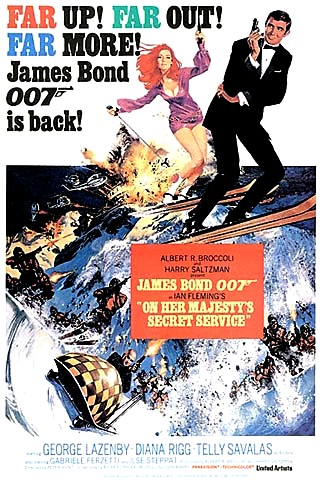 James Bond, Fleming's primary literary creation, was a spy. It's impossible to describe Bond without reverting a series of word associations made possible by his ubiquitous status as a cultural icon. He was Agent 007, a member of Her Majesty's Secret Service. He had a license to kill. He worked for a guy named M and with another guy named Q, and he sexually harassed his boss's secretary, Miss Moneypenney.
James Bond, Fleming's primary literary creation, was a spy. It's impossible to describe Bond without reverting a series of word associations made possible by his ubiquitous status as a cultural icon. He was Agent 007, a member of Her Majesty's Secret Service. He had a license to kill. He worked for a guy named M and with another guy named Q, and he sexually harassed his boss's secretary, Miss Moneypenney. 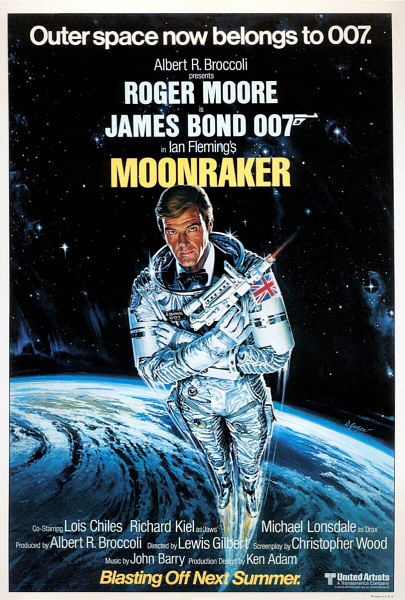 This crucial enhancement made Bond movies into date material, providing a male wish-fulfillment fantasy trip while serving up eye candy to keep girlfriends and wives in their seats. It was money in the bank.
This crucial enhancement made Bond movies into date material, providing a male wish-fulfillment fantasy trip while serving up eye candy to keep girlfriends and wives in their seats. It was money in the bank. 